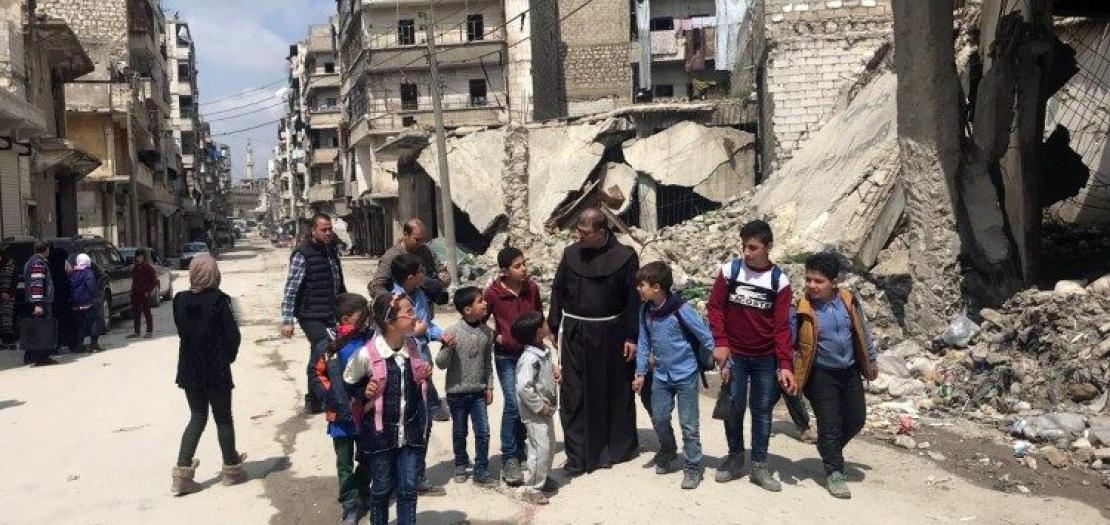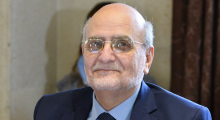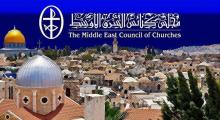Issued by the Catholic Center for Studies and Media - Jordan. Editor-in-chief Fr. Rif'at Bader - موقع أبونا abouna.org

On March 11 we were able to speak to Fr. Bahjat Elia Karakach, friar of the Custody of the Holy Land and the parish priest of the community of Aleppo, by phone. After the dramatic earthquake on February 6 which brought Turkey and Syria to their knees, Father Bahjat has been in the front line, with his brothers, providing material aid to the families who have lost their homes and supporting the local population.
Father Bahjat, we know that the Franciscan community has worked non-stop to support the inhabitants of Aleppo. Can you help us understand what the situation is in Aleppo at the moment, just over a month since the earthquake?
Until March 10, we coped with more than 3000 people, who were able to stay in the Terra Santa College. It was a very delicate situation and people were even more afraid due to the catastrophic news circulating online, with a strong tremor announced for March 8. Now, gradually, the people who still have homes are going back to them; whereas the people who have no home to go back to have stayed in our facilities, and there are about 300 of them. They are families and the elderly whose homes have been severely damaged. The daily activities have resumed in the parish and the schools, at least the Catholic ones, have reopened, except the ones that are used for people to stay in. In Aleppo there are various facilities, but there are still people sleeping in the streets, in their cars or they have simply put up tent in the streets. We are continuing to distribute meals every day (even helping some hospitals) and in terms of quantity, this means about 1,500 meals per day.
People are very afraid to go back to their homes; we can only imagine the terror that they lived through.
Yes: now the most important thing is to check and monitor the houses that are unstable, to let people go home, when possible. This is why thanks to an initiative of ours agreed with the Aleppo city council, we have a team of Italian technicians staying with us in our convent; they are specialized engineers who, supporting the local technicians, are monitoring and checking the stability and the solidity of old buildings and private homes. We have learned that there are about 5000 buildings which are severely damaged that have to be evaluated.
What is the situation like in the Valley of the Orontes and in Lattakia (two other centers which were severely hit by the earthquake)?
The situation in the Valley of the Orontes is dramatic because there almost 80% of the homes were destroyed. In Lattakia as well, there are many buildings in a precarious state. Unfortunately we have to live with the idea that this is an emergency situation which will last for months, everywhere: also because here there is absolutely no question of compensation or economic aid for those who have lost their homes.
Father Bahjat, in seeing and helping thousands of people every day, which is the category that in your opinion is the most traumatized by this calamity?
The most fragile categories are definitely children and the elderly. However, the children, even though they are more frightened, are more easily distracted by many things: we have created many hours of entertainment to make the atmosphere lighter. We have distracted them with films, games, meetings. The situation of the elderly and the sick is different, they are certainly weaker and more tired. In the past ten years, many young people and many young couples have left Syria and left their parents on their own. Now, these same parents who until ten years ago were self-sufficient and autonomous, are clearly no longer able to look after themselves. These elderly people and these sick people have ended up in an extraordinary and dramatic situation without any support, not even of their families and loved ones.
How can we help your community from afar? How can we show solidarity and give real support to your work?
As far as “how to help” and how to help us are concerned, the most direct way is certainly through the funds being raised also because as Syria is under embargo, it is complicated to get material aid into the country and so it is a good thing to have funds to draw on to purchase staple goods. We use this money to buy food and above all medicines which have recently increased in price exponentially. And we help the families pay for operations, which otherwise would be impossible as they are very expensive. Then we support the sick in finding medicines and letting them have operations. These funds are also used for student and children who cannot pay for their schooling. I would like to underline, in a word, that the situation in Syria is “wrecked”: as the Church, we are filling in for the institutions and coping with the emergency in all those situations where the state structure has never been able to act.







